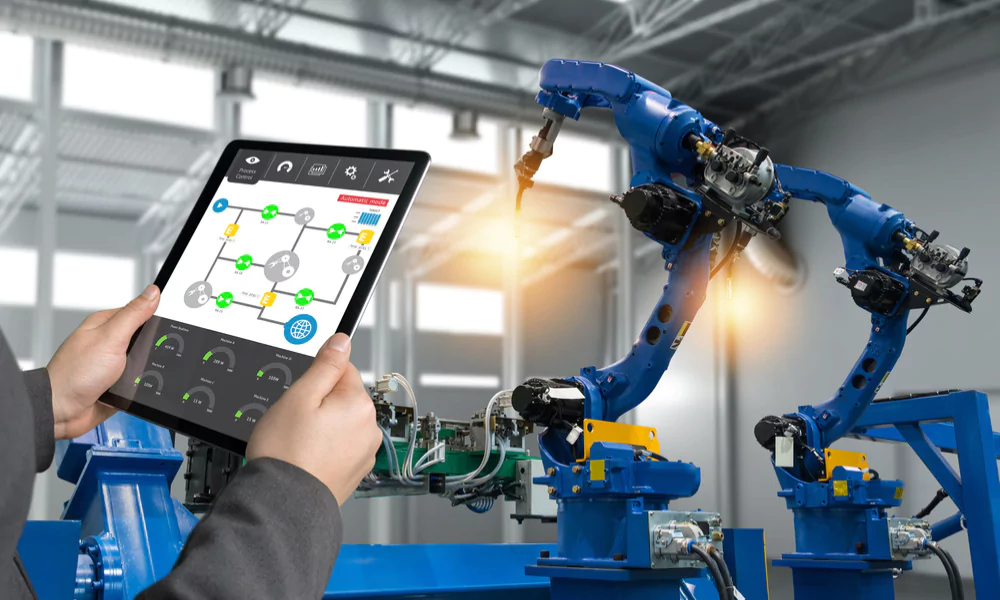
Any gain in productivity for small to mid-sized manufacturers can leave a huge impact. One such factor that is changing the manufacturing business is automation. It offers significant advantages, but many small and mid-sized enterprises (SMEs) believe that robotics is too big of an investment.
Some of them cannot afford complex robotics. But there is a unique solution to this bottleneck. Recent robotic models specifically made for SMEs are comparatively affordable. They do not need much personalised or expert personnel for their maintenance. They are worth the investment.
This new generation of industrial robotic solutions or collaborative robots (“cobots”) is changing the game for smaller manufacturers. They are helping them compete more effectively.
Let’s see how they are affecting the manufacturing industry.
Why Do You Need Industrial Robotic Solutions
Here are a few advantages that robotics can bring into SMEs:
1. Flexibility
SMEs are constantly growing and a once important process may not carry the same weight anymore. With robotic solutions, this will not be the case. You can pack down the robot, transport and repurpose it. This means regardless of the production line it goes on, the transition can be seamless.
2. Future Proof
The world is slowly moving towards a more technological focus. Robots are the first thing that many SMEs will adopt. By training your team to learn how industrial robotic solutions can help productivity, you make smarter decisions within the workforce. Your SME can be one step ahead of the competition. This is more advantageous when you work in a niche market.
3. Compact
Usually, SMEs do not have large warehouses for their operations. As such, any solution such as robotics needs to fit physically into the process. Therefore, companies need to ensure that the robots are small in size and can seamlessly integrate into their existing systems.
4. Reliable
There are many robotic suppliers across the world. SMEs need to be careful regarding who they work with. To avoid issues, it is always best to avail the best experts at the industrial robotic solutions. Choosing suppliers that are always strong and reliable can help with attesting to the quality of the industrial robot applications.
5. Local Knowledge/ Spares/ Support
SMEs can trust that the knowledge they get is local and the support is just a phone away. There is no need to wait for help to arrive from overseas. The solution provider is always available at all times to make repairs and amendments to your cost-effective robotics technology.
Knowing how automation with robotic solutions can upgrade your SME, you need to choose the right solutions. There are plenty of offers that these technologies offer. So, let’s have a look at six of the most popular ones.
6 Automation Solutions for Manufacturing SMEs
These automation solutions are a game changer for SMEs. Not only are they inexpensive, but they also save time and enhance accuracy and efficiency.
1. Smart Production Line Integration
Intelligent automation systems in manufacturing SME production lines ensure that they are placed in the competitive frontline. Implementation of up-to-date robotics, IoT sensors, and AI-oriented analytics allows small and medium-sized facilities to simplify the production process, which increases productivity and lowers running expenditures.
- Automated material handling, predictive monitoring, and real-time monitoring are going to prepare an agile reaction to market needs as they will maintain high-quality standards.
- Another factor to be mentioned regarding these options is that they pave the way for data-based decision-making, enhancing the availability of timely resource planning and administrative processes by SMEs.
Business owners in manufacturing SMEs should think of this as a key element. Such industrial robotic solutions will help them maintain a competitive edge amidst a fast-changing industry scenario.
2. Customizable Manufacturing Execution Systems (MES)
Manufacturing of finite-scale MES solutions provides the entities of small and medium enterprises with the adaptability and scalability required to meet the different production needs.
- Systems of such kind are superior in their ability to fully control manufacturing processes both at the planning and scheduling levels, as well as reporting.
- Utilising a flexible approach through MES platforms enables SMEs to adapt the operations workflows, minimise downtimes, and improve product quality.
- On top of that, you can readily monitor supply chains in real time with the help of the provided data visibility. This allows for better resource utilisation and improved inventory management which leads to cost savings and increased profitability.
An effective MES implementation that is customisable for SMEs is a vital tool. It enables entrepreneurs to regularly update their technology in response to both industry-specific issues and to keep up with the industry norms.
3. Collaborative Robots (Cobots)
Robots may speed up the process but they still need human supervision. Therefore, solutions like “cobots” have become increasingly popular in the industrial space.
A collaborative robot, otherwise known as a cobot, is an industrial robot that can easily and safely operate alongside humans in a shared workspace.
- Incorporating industrial robotic solutions like cobots in performing mechanical jobs is not going to result in job losses. Simple pick-and-place tasks or screwing and welding tasks in an assembly line are some of the functions that the cobots would perform. This would increase the efficiency of existing workers.
- Including cobots would dramatically improve job performance and output.
- A study titled ‘Automation of SME production with a Cobot system powered by learning-based vision suggests that Collaborative Assemble Systems (CAS) employing Human-Robotic Collaboration (HRC) systems have multiple positive outcomes.
- Industrial robotic solutions could also reduce workplace fatigue
It could reduce workplace fatigue and injuries and significantly mitigate fatigue-induced loss of production, which currently costs up to 2% of the EU’s Gross Domestic Product (GDP).
Other than cobots many more innovations will change the landscape of industries. Let’s see what they bring to the warehouse floor.
4. AGV and AMRs
Automated Guided Vehicles (AGV) and Autonomous Mobile Robots (AMR) help with material transportation on the factory floor. They systematically and effectively allocate resources.
Manufacturing industries already use these robots to streamline logistical processes. They also automate repetitive tasks.
5. Articulated Robots
These robots are highly versatile mounted robots. Manufacturers can program these articulated robots to perform several tasks. They have multiple rotary joints that can reach out to tools, compartments and objects.
They truly are one of the ideal industrial robotic solutions. As one of the most commonly used tools for automating repetitive tasks in manufacturing, it helps with an array of tasks. Some of them include picking, packing, tending, inspecting, dispensing, assembly, or welding.
Metal fabrication units usually use these robotic welding systems to automate welding processes. They are infamous for being physically demanding and causing eye damage to humans.
Thankfully automation can help workers from strenuous physical labour and indirectly their health.
6. Other SME Automation Robots
In small-scale production or prototyping:
- 3D printing robots are useful for large-scale and diverse industries. They create intricate and customised parts. It is easier to fabricate parts with them.
- One of the most expensive things when it comes to automation in the manufacturing small-scale industry is space. Small robots with obstacle-detection sensors can detect clutter and identify unused space. This helps in the optimal use of the factory floor.
- Lastly, new-age industrial robotic solutions allow the integration of conveyor systems that workers can use for AI-vision and sensor-based visual analytics of products for quality checks.
Such innovations that are rapidly evolving in their methods and configuration bring a new era to industry logistics.
FAQs: Industrial Robotic Solutions for Small and Medium Enterprises
What are the types of industrial robots?
There are several robot types which integrate into industrial production such as articulated robots, SCARA robots, delta robots, cartesian robots and collaborative robots. Each of them combines special parts just made for diverse activities either robotized assemblage, welding or moving materials.
What is the use of AI in SMEs?
AI is significant to SMEs as it can do some repetitive job tasks, make decisions through data analysis, connect to clients via chatbots, optimise supply chain management optimization, and increase productivity of operation and efficiency.
What is a significant barrier to robotic solutions adoption in SMEs?
One of the major obstacles in the process of robotics integration to SMEs is the high initial cost of establishing these technologies which involves buying and installation which are a part of integration processes.
Conclusion
Summing up, setting up industrial robotic solutions can greatly help SMEs that value productivity growth. More competitively priced and user-friendly options are popping up in the market. Qodenext draws upon its on-hand expertise to ensure smooth compatibility while equipping SMEs with essential tools for competitive success in an ever-changing market.


